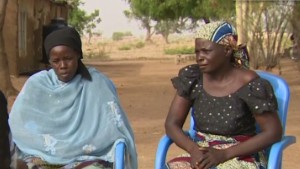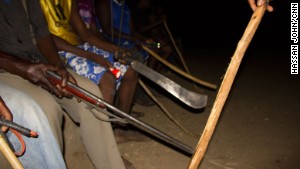Recent Articles
Home » All posts
Tuesday, May 20, 2014
Tuesday, May 20, 2014
- 0 Comments
By Kocha Olarn and Catherine E. Shoichet, CNN
May 20, 2014 -- Updated 0149 GMT (0949 HKT)
STORY HIGHLIGHTS
- NEW: Thailand's military says TV and radio stations must suspend programing "when it is needed"
- Government aide calls the situation "half a coup d'etat," says military's action was unilateral
- Thailand's Army has declared martial law but stresses the move is not a coup
- Professor: The situation is "very volatile"
Bangkok (CNN) -- The Thai army declared martial law throughout the country Tuesday in a surprise move that an aide to the country's embattled Prime Minister said the government didn't know about beforehand.
"They took this action unilaterally. The government is having a special meeting regarding this. We have to watch and see if the army chief honors his declaration of impartiality," the aide said, describing the situation as "half a coup d'etat."
Lt. Gen. Nipat Thonglek told CNN the move was not a coup.
"The Army aims to maintain peace, order and public safety for all groups and all parties," a ticker running on the army's television channel said. "People are urged not to panic, and can carry on their business as usual. Declaring martial law is not a coup d'etat."
Martial law went into effect at 3 a.m. on Tuesday, the ticker said.
All Thai TV stations are being guarded by the military, Thai public television announced, showing pictures of soldiers and armored vehicles taking positions outside broadcast facilities in the country's capital.
In a statement read on Thai television, the military declared that all of the country's radio and television stations must suspend their normal programs "when it is needed."
The dramatic announcements come days after the head of the army issued a stern warning after political violence had surged in the country's capital.
Political tensions have been running high in Thailand. Supporters and opponents of the country's government have staged mass protests in recent days, and caretaker Prime Minister Yingluck Shinawatra was removed from office, along with nine cabinet ministers, by a top court earlier this month.
Thitinan Pongsudhirak, a political science professor, described the situation as "very volatile."
"This is a precarious time now for the army," he said. "They have to be even-handed."
If the military appears to be favoring one side, he said, violence could escalate rather than cool down.
"If it's seen as favoring one side or the other side, then we could see more violence and turmoil against the military," he said.
Nipat said the precise restrictions of martial law were being worked out.
The government's "red shirt" support base, many of whom hail from the country's rural north and northeast, view Yingluck's ouster as a "judicial coup" and have been protesting what they consider an unfair bias by many of the country's institutions against their side.
Anti-government protesters are seeking a new government -- but not through elections, which the opposition Democrat Party has boycotted, arguing the alleged corruption of their political rivals makes widespread reform necessary before any meaningful vote can be held.
Source:CNN News International
Wednesday, May 14, 2014
Wednesday, May 14, 2014
- 0 Comments
By Tolu Ogunlesi, Special to CNN
May 13, 2014 -- Updated 1556 GMT (2356 HKT)
 People march in Lagos, Nigeria, on Monday, May 12, to demand the release of schoolgirls kidnapped from Chibok last month. The abduction of nearly 300 female students who remain captives of the Islamist militant group Boko Haram has attracted mounting national and international outrage.
People march in Lagos, Nigeria, on Monday, May 12, to demand the release of schoolgirls kidnapped from Chibok last month. The abduction of nearly 300 female students who remain captives of the Islamist militant group Boko Haram has attracted mounting national and international outrage.
HIDE CAPTION
Nigerians protest over kidnapped schoolgirls
STORY HIGHLIGHTS
- More than 200 schoolgirls kidnapped in Nigeria on April 14 are still missing
- The mass abduction has been claimed by militant Islamist group Boko Haram
- The United States is among the countries that have offered to help Nigeria find the girls
- Tolu Ogunlesi says Nigerians realize foreign help is needed but query U.S. motives
Editor's note: Tolu Ogunlesi is a Nigerian journalist who was awarded the Arts and Culture prize in the 2009 CNN MultiChoice African Journalist Awards. Follow @toluogunlesi on Twitter. The opinions expressed in this commentary are solely those of the author.
(CNN) -- The Nigerian government is up against a wall. The inability to locate the more than 200 school girls abducted a month ago has embarrassed the government and forced President Goodluck Jonathan to appeal for foreign help as Nigeria's five-year struggle with terrorist group Boko Haram escalates.
It does seem that Nigerians are caught in the difficult position of having to welcome the help and be deeply wary of it. On the one hand we know, from the evident helplessness of our government, that we're at the point where we cannot make any progress without the skills and knowledge and technology that Western countries will bring to this battle.

Tolu Ogunlesi
On the other hand, there are questions (running the gamut of conspiracy theory to reasonable concern) about America's motivations, and its track record.
"I have my reservations," says Debo Bashorun, a retired Nigerian army major who served as press secretary to military president Ibrahim Babangida in the late 1980s, and is now a vocal critic of the Nigerian military. "[Now] this is a good time [for the Americans] to do what they've always wanted to do," Bashorun says.
He's referring to the U.S. Africa Command (AFRICOM), run by the U.S. Department of Defense, and established by President George W. Bush in 2007. From early on African leaders opposed attempts to site AFRICOM's headquarters in Africa.
On his first official trip to Washington as president in December 2007, on the invitation of President Bush, Nigeria's President Yar'Adua made comments that were interpreted back home to mean that Nigeria was acceding to America's AFRICOM-in-Africa push.
It doesn't help that many Nigerians believe, on the strength of pessimistic American assessments of Nigeria's fate, that its inclinations towards their country are sinister.
Tolu Ogunlesi
Tolu Ogunlesi
Outrage in Nigeria compelled the president to declare that he "did not agree that AFRICOM should be based in Africa."
"What we discussed with [President] Bush is that if they have something to do for Africa that has to do with peace and security, they should contribute. I told him that we African countries have our own plan to establish a joint military command in every sub-region ..." he said.
Segun Adeniyi, Yar'Adua's spokesperson, says those comments displeased America. "[By] openly repudiating the idea of AFRICOM, Nigeria's relationship with the U.S. on Yar'Adua's watch had started on a very bad note. It was a relationship that would remain at a less-than-inspiring note throughout his tenure," Adeniyi writes in his book, "Power, Politics and Death," an account of the Yar'Adua administration.
Nigerians are right to be wary of America's military intentions, with the cautionary tales of countries like Iraq and Pakistan.
"This is a transactional relationship; there's nothing strategic about it," said Ehsan ul-Haq, retired Pakistani general and one-time head of the country's Intelligence Agency ISI, of U.S.-Pakistani military relations, at a reporting seminar for journalists which I attended in London in 2011.
He added that the cumulative value of U.S. military assistance to Pakistan ($20 billion at that time, he said) paled into insignificance compared to Pakistan's losses from the war on terror --- which he put at not less than $68 billion.
 Mother of missing girl: 'Our hearts hurt'
Mother of missing girl: 'Our hearts hurt' Nigerians take security into own hands
Nigerians take security into own hands Could girls be freed with prisoner swap?
Could girls be freed with prisoner swap? Nigerian girl escapes from Boko Haram
Nigerian girl escapes from Boko Haram
Bashorun echoes those views. "America will not do it out of honest intentions," he told me. "It's a matter of giving you 10 naira and in the long run they will collect 50 naira," he says.
But he is pragmatic enough to realize that at this point Nigeria has got little choice in the matter. "If we had done what we were supposed to have done, things wouldn't have turned out like this," he says.
Then again there's the strong possibility that suggestions of the United States turning Nigeria into another Iraq or Pakistan are unfounded.
Anonymous Nigerian defense blogger, Beegeagle, points out that Nigeria has long enjoyed significant levels of cooperation with the United States, in terms of receiving donations of hardware and training.
"The difference in this latest American effort is that the U.S are going to collaborate with Nigeria in the field --- an undisguised first," he wrote in an email message to me. But even that field work, he says, will not involve "putting [American] soldiers on the ground to fight alongside Nigerian soldiers."
That will no doubt be comforting to many observers. But there's obviously still a lot that needs to be clarified regarding the extent and mode of foreign help Nigeria will be getting. For now the solidarity mounts; at the last countAmerica, Britain, China, Canada, France and Israel had already thrown in offers of assistance.
Nigerians will of course continue to be wary, and quick to bristle at any threats, real or imagined, to Nigeria's sovereignty. It doesn't help that many Nigerians believe, on the strength of pessimisticAmerican assessments of Nigeria's fate, that its inclinations towards their country are sinister.
And Nigerians have been there before. Shortly after Independence in October 1960, Nigeria's Parliament formally approved the terms of a controversial "Anglo-Nigerian Defence Pact," which the Nigerian public had come to believe would give the departing colonial power the right to set up military bases in Nigeria.
The protests that followed, led by student and labor groups, resulted in the speedy repeal of the agreement by the Federal Government barely a year-and-half later.
Source:CNN News International
By HENRY ALFORD

Getting Away, and Pitching In, at Monestevole
CreditGiulio Piscitelli for The New York Times
Continue reading the main storyShare This Page
Pride makes fools of us all. Three days into my stint as a farmer at Monestevole, a 98-acre farm nestled atop a hill in Umbria, I was flooded with feelings of smug accomplishment. I was watering the patch of artichoke and tomato seedlings that I’d painstakingly planted the day before, when a farmhand named Brad walked by with a cow. I wanted to get Brad to acknowledge my efforts, but my Italian is limited to ordering and waxing enthusiastic about eggplant Parmesan.
Flailing, I blurted, “Io io fatto,” which I hoped meant “I did this myself,” but which is more accurately translated as “I I done.” Brad looked at me, baffled. “Whoops!” my brain computed, “I think I just told him ‘I am the fat one.’ ” So I frantically pantomimed the action of planting, whereupon Brad said, “Ah. Planta.” Plant. He nodded, so I nodded back. Brad’s nod conveyed “Nice job.” My nod conveyed “But I’m quite fit for my age, no?”
I attribute my egoism to my circumstances. You see, I wasn’t staying at your run-of-the-mill agriturismo. No, I was staying at the new property started by Tribewanted, the organization that creates sustainable communities by selling $16-a-month memberships to online “tribe members” who get decision-making powers and preferential rates when they stay at the properties (where they’re encouraged, but not required, to help out with chores).
Though the first community that Tribewanted started in Fiji in 2006 is no longer under the organization’s auspices, after an exorbitant increase in its land lease, its creation drew some 1,500 visitors and led to “Paradise or Bust,” a five-part series that aired on the BBC in 2008. The second property, in Sierra Leone, sits on a beach alongside a fishing village, and has been visited by about 450 guests, including the actors Rosario Dawson and Jeffrey Wright. A new Tribewanted community has just been started in Mozambique.
Continue reading the main storyMonestevole, being in the developed world, is a bit of a departure. Here, the hope is that the property — which sleeps 25 and opened in April 2013, only two weeks before I arrived — will become self-sustaining via paying guests, as well as through the sale of Monestevole’s olive oil and wine.

ITALY
10 MILES
Siena
A1
Monestevole
TUSCANY
Lake
Trasimeno
Montepulciano
Assisi
Perugia
Montalcino
La Foce
Sarteano
UMBRIA
Castiglioncello del Trinoro
MOUNT AMIATA
A large 15th-century three-story stone house surrounded by olive groves, vegetable gardens, a vineyard and pastures for farm animals, the lovely Monestevole was once a watchtower for a castle on the other side of the mountain. Staying there feels like living in a handsomely but minimally appointed garrison; it’s easy to imagine pouring burning oil from its upper floors’ windows.
Though I could ascribe a slew of adjectives to the week I spent at Monestevole — relaxing, mysterious, slow-moving — none seem so accurate as self-designed and spontaneous. I arrived thinking that I would volunteer as kitchen help, but when my offers to cut vegetables or wash dishes were gently rebuffed, I realized that I’d be more helpful as a planter of artichokes and tomatoes. So most mornings and some afternoons, I’d devote a few hours to the small garden next to the house, aided by Filippo Bozotti, the handsome, animated, 33-year-old former documentary maker who co-founded and now runs Monestevole.
Given that Tribewanted is rooted in nobly democratic ideals, I was fairly desperate to be perceived as a committed member of the community. And yet ... I am only human. “Tomorrow we will plant vegetables,” Mr. Bozotti told me shortly upon arrival. I said: “I’d like to help. But are you looking for someone to dig holes in the ground, or someone to put plants in holes with precision? Because I’m more of a precision man.” Mr. Bozotti said both types of workers were needed.
I figured that my prissy enthusiasm helped establish my reputation. As did the fact that the only other guests were two Canadian pediatricians who were on a kind of delayed honeymoon with their 11-month-old and, understandably, didn’t want to do many chores. But I worried vaguely about a story about Diana Ross that New York magazine had run in 2009. Ms. Ross, anxious to meet her ancestral tribe, traveled to an island in Lake Baringo in Kenya. The meeting with the Pokot people went well until the grandmother of an important chief showed respect by “sharing water” with Ms. Ross — that is, she spit in her face. At which point Ms. Ross screamed, “This is not my tribe!”
I didn’t want to pull a Diana. So I inserted tomato and artichoke seedlings into the ground with a vigor I usually reserve for hailing bartenders. I tried, too, to bring a dash of candor to my fieldwork: “If it appears that I’m wearing makeup, I’m not,” I told the wife of the Canadian couple one day while gardening. “I had to buy some moisturizer in Rome and, not speaking Italian, ended up with tinted moisturizer.”

The impromptu, seat-of-your-pants nature of life on a working farm initially frustrated me but ultimately became my favorite part. Though a continental breakfast was reliably available in the oak-timbered dining room from 7:30 to 10 a.m., other mealtimes were tinged with mystery. Most nights, I lurked in the dining room’s adjacent parlor, pretending to read a book, lest I miss one of the delicious, family-style dinners of roasted vegetables, hearty pastas and grilled meats. Other patches of unknowing included: Why was the pool closed during my stay? Should I be watering the plants I’ve put in, or will one of the farm’s seven or eight day laborers do that? How come, when I milked the cow and then boiled and drank the milk, it tasted like a chèvre-accino?
On the flip side, there were moments I will never forget. One afternoon while I was gardening, Mr. Bozotti called out, “Ciao, Henry! Want to help move the pigs into another pen?” I assented and ran down to the barn. I’d been told the day before that the folks at Monestevole don’t feed the pigs meat, as “otherwise they’ll start to think of us humans as meat.” So when Mr. Bozotti handed me a pitchfork and said, “Use the handle end to guide the pigs — but if the mother pig starts coming at you, use the pitchfork end,” I gulped. What if I didn’t turn the pitchfork around fast enough? I imagined a grainy black-and-white photo of my gored body, and a tabloid headline that screamed “Prosciuttoed!”
Fortunately, I escaped goring. Four of us tool-wielding farmhands delicately guided the mother pig and her 10 babies down the dirt road to another pen, from which we then tried to decant a much larger black pig from a scrum of her noisome cohort: The whole operation seemed to be an elaborate metaphor for the Italian political system.
Equally memorable were activities involving Alessio Giottoli, the head of the farm, who, with his wife, had bought Monestevole as a ruin in the mid-1990s and restored it. (The Giottolis no longer work for Tribewanted, but now live next door.) A longhaired, wild-eyed 39-year-old, Mr. Giottoli charmingly refers to all males as “Giordano” and all females as “Giordana.”
Continue reading the main story
Advertisement
On Day 4 I joined Mr. Giottoli and Mr. Bozotti for a three-hour adventure in which we three Giordani drove to Calzolaro and bought some 500 grapevines and a truckload of sand for the vineyard. Driving our haul back, Mr. Giottoli said: “Tonight, after planting, we will have a traditional party in the vineyard. There is a famous song about how grapevines are better when you ...” I took a stab: “... when you make love on them?” Mr. Giottoli said, “Yes. This.”

That evening, while the Canadian guests and I were enjoying a glass of wine and playing boules in the backyard, Mr. Giottoli’s wife, Valeria, stuck her head out of the kitchen and said: “We are going to the barbecue in the vineyard soon. If you want glasses, plates, silverware, you must bring them, otherwise we eat with the hands.” She disappeared into the kitchen. I looked at the Canadians. The Canadians looked at me. I said: “This is a test. The test is called, How Urban Are You?”
We decided to each bring only a glass. Mr. Bozotti approached us and said: “This meal will be rustic. We can come back and have a full dinner if you want.” The Canadians and I, eager Tribe members, sang out, No, no, no, Rustic is our middle name.
We wandered over to the vineyard, where we joined Monestevole’s eight full-time residents and seven or so workers, some of whom were sitting on the ground, none of whom were making love. Red wine aplenty; two guitars leaning against a fence. On a small, portable grill, Mr. Giottoli was grilling glistening ribs, chicken, pancetta and boar sausage; we’d slice a hunk of bread that was sitting on a napkin on the back of a pickup truck, then wrap the bread around the meat. Or, you’d simply take a piece of meat directly from Mr. Giottoli, an action best suited for the calloused fingertips of the career farmer. I felt as if I was in a Bruegel painting.
By Day 5, I felt that I’d shown myself to be a semivaluable member of the Tribe, and I increasingly holed up in my cool, dark, comfortable room, with its antiques and carpet-laden stone floor. I stared out its windows, slowly morphing in my mind from volunteer farmer to executive farmer. I’d made my mark as a planter, after all, but then showed diversity with pig-decanting and grapevine-purchasing; I’d also paved the way for frank discussions in the agricultural community of male cosmetics.
So I decided that I deserved a treat: a day trip with the two Canadians to nearby Perugia and Assisi. Mr. Bozotti lent us the farm’s Chevy Volt and we zoomed off noiselessly, the car’s GPS guiding the way through the hilly, mist-shrouded landscape. In crowded Perugia, about a half-hour away, we ate chocolate and wondered where Amanda Knox had lived, and in gorgeous Assisi we marveled at the pink rock the city is built of and then descended into a church basement and viewed St. Francis’s tomb. Delightful.
On my last day, I walked down to the corrals and barn and said goodbye to the 10 piglets and the five horses that I’d visited each morning. Then I surveilled the artichokes and tomatoes and asparagus I’d planted, and glimpsed the vineyard I’d help set in motion. From time to time during my trip, I’d been doing this inventory, making a kind of mental tally.
But now, knowing that I was skipping out on it all and leaving its care to others, I could see my contributions for what they were: tiny ripples in Monestevole’s ocean. I’d arrived anxious to have my individuality and efforts acknowledged, but I was leaving, having realized that I was a sole Giordano in a network of Giordani.
Moreover, I now feel toward subsequent Monestevole visitors how Laura Ingalls Wilder must have felt toward prairie transplants: They are all my Giordaninni.
Source:The New York Times
 Alex Nabaum
Alex NabaumSuch quotidian decisions test a mental ability called cognitive control, the capacity to maintain focus on an important choice while ignoring other impulses. Poor planning, wandering attention and trouble inhibiting impulses all signify lapses in cognitive control. Now a growing stream of research suggests that strengthening this mental muscle, usually with exercises in so-called mindfulness, may help children and adults cope with attention deficit hyperactivity disorder and its adult equivalent, attention deficit disorder.Which will it be — the berries or the chocolate dessert? Homework or the Xbox? Finish that memo, or roam Facebook?
The studies come amid growing disenchantment with the first-line treatment for these conditions: drugs.
In 2007, researchers at the University of California, Los Angeles, published a study finding that the incidence of A.D.H.D. among teenagers in Finland, along with difficulties in cognitive functioning and related emotional disorders like depression, were virtually identical to rates among teenagers in the United States. The real difference? Most adolescents with A.D.H.D. in the United States were taking medication; most in Finland were not.
“It raises questions about using medication as a first line of treatment,” said Susan Smalley, a behavior geneticist at U.C.L.A. and the lead author.
In a large study published last year in The Journal of the American Academy of Child & Adolescent Psychiatry, researchers reported that while most young people with A.D.H.D. benefit from medications in the first year, these effects generally wane by the third year, if not sooner.
“There are no long-term, lasting benefits from taking A.D.H.D. medications,” said James M. Swanson, a psychologist at the University of California, Irvine, and an author of the study. “But mindfulness seems to be training the same areas of the brain that have reduced activity in A.D.H.D.”
“That’s why mindfulness might be so important,” he added. “It seems to get at the causes.”
Depending on which scientist is speaking, cognitive control may be defined as the delay of gratification, impulse management, emotional self-regulation or self-control, the suppression of irrelevant thoughts, and paying attention or learning readiness.
This singular mental ability, researchers have found, predicts success both in school and in work life.
Cognitive control increases from about 4 to 12 years old, then plateaus, said Betty J. Casey, director of the Sackler Institute for Developmental Psychobiology at Weill Cornell Medical College. Teenagers find it difficult to suppress their impulses, as any parent knows.
But impulsivity peaks around age 16, Dr. Casey noted, and in their 20s most people achieve adult levels of cognitive control. Among healthy adults, it begins to wane noticeably in the 70s or 80s, often manifesting as an inability to remember names or words, because of distractions that the mind once would have suppressed.
Bolstering this mental ability, specialists are now suggesting, might be particularly helpful in treating A.D.H.D. and A.D.D.
To do so, researchers are testing mindfulness: teaching people to monitor their thoughts and feelings without judgments or other reactivity. Rather than simply being carried away from a chosen focus, they notice that their attention has wandered, and renew their concentration.
According to a recent report in Clinical Neurophysiology, adults with A.D.D. were shown to benefit from mindfulness training combined with cognitive therapy; their improvements in mental performance were comparable to those achieved by subjects taking medications.
The training led to a decline in impulsive errors, a problem typical of A.D.D., while the cognitive therapy helped them be less self-judgmental about mistakes or distractedness.
Mindfulness seems to flex the brain circuitry for sustaining attention, an indicator of cognitive control, according to research by Wendy Hasenkamp and Lawrence Barsalou at Emory University.
For a study published in Frontiers in Human Neuroscience, they imaged the brains of meditators while they went through four basic mental movements: focusing on a chosen target, noticing that their minds had wandered, bringing their minds back to the target, and sustaining their focus there.
Those movements appeared to strengthen the neural circuitry for keeping attention on a chosen point of focus.
Meditation is a cognitive control exercise that enhances “the ability to self-regulate your internal distractions,” said Dr. Adam Gazzaley, a neuroscientist at the University of California, San Francisco.
His research seeks to duplicate these effects with video games that “selectively target the key circuits without the kind of side effects you get with drugs.”
With colleagues, he designed NeuroRacer, a game for older adults in which they respond to traffic signs that appear suddenly while driving on a winding road. The game enhanced cognitive control in subjects ranging from 60 to 85, according to a study published in Nature.
Stephen Hinshaw, a specialist in developmental psychopathology at the University of California, Berkeley, said the time was ripe to explore the utility of nondrug interventions like mindfulness.
Dr. Swanson agreed. “I was a skeptic until I saw the data,” he said, “and the findings are promising.”
Source:The New York Times
Subscribe to:
Posts (Atom)



